初中英语听力材料
初中英语听力训练材料及话题简述训练
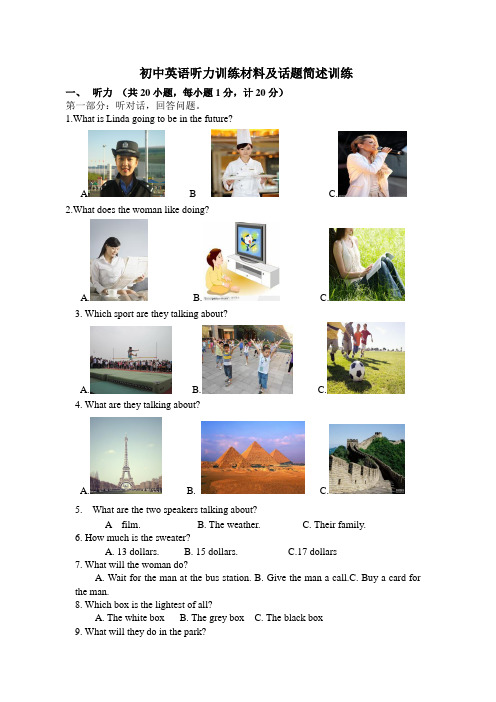
初中英语听力训练材料及话题简述训练一、听力(共20小题,每小题1分,计20分)第一部分:听对话,回答问题。
1.What is Linda going to be in the future?A B C.2.What does the woman like doing?A. B. C.3. Which sport are they talking about?A. B. C.4. What are they talking about?A. B. C.5. What are the two speakers talking about?A film. B. The weather. C. Their family.6. How much is the sweater?A. 13 dollars.B. 15 dollars.C.17 dollars7. What will the woman do?A. Wait for the man at the bus station.B. Give the man a call.C. Buy a card for the man.8. Which box is the lightest of all?A. The white boxB. The grey boxC. The black box9. What will they do in the park?A. Take some photosB. Buy something to drinkC. Play a game10.Where will the woman go tomorrow if it is fine?A. The parkB. The zooC. The Great Wall第二部分:听对话和短文回答问题。
听第一段对话,回答11---12小题。
11. Who are they? A. A mom and a son. B. A doctor and a patient (病人).C. A teacher and a student.12. What are they talking about?A. Where to eat lunch.B. How to be against rules (违反规则).C. What to do on the playground.13.14. A. Name B. Who C. Hero(偶像)15.A. a famous singer B. a basketball player C. a good swimmer听第二篇短文,回答16——20小题。
人教版英语八年级上册听力材料及答案
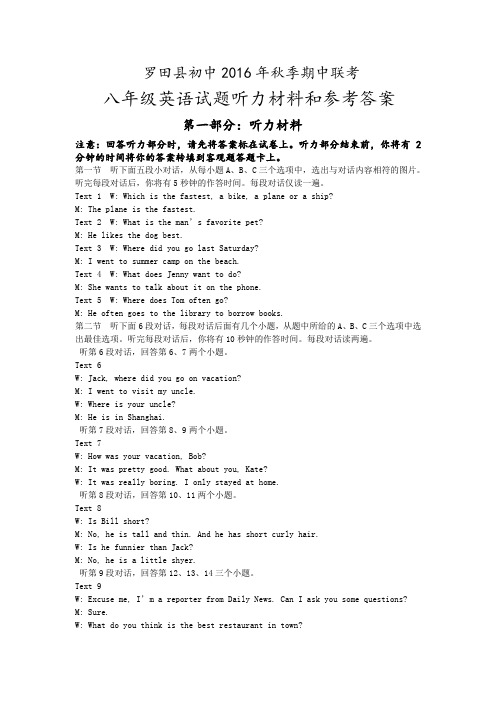
罗田县初中2016年秋季期中联考八年级英语试题听力材料和参考答案第一部分:听力材料注意:回答听力部分时,请先将答案标在试卷上。
听力部分结束前,你将有2分钟的时间将你的答案转填到客观题答题卡上。
第一节听下面五段小对话,从每小题A、B、C三个选项中,选出与对话内容相符的图片。
听完每段对话后,你将有5秒钟的作答时间。
每段对话仅读一遍。
Text 1 W: Which is the fastest, a bike, a plane or a ship?M: The plane is the fastest.Text 2 W: What is the man’s favorite pet?M: He likes the dog best.Text 3 W: Where did you go last Saturday?M: I went to summer camp on the beach.Text 4 W: What does Jenny want to do?M: She wants to talk about it on the phone.Text 5 W: Where does Tom often go?M: He often goes to the library to borrow books.第二节听下面6段对话,每段对话后面有几个小题,从题中所给的A、B、C三个选项中选出最佳选项。
听完每段对话后,你将有10秒钟的作答时间。
每段对话读两遍。
听第6段对话,回答第6、7两个小题。
Text 6W: Jack, where did you go on vacation?M: I went to visit my uncle.W: Where is your uncle?M: He is in Shanghai.听第7段对话,回答第8、9两个小题。
Text 7W: How was your vacation, Bob?M: It was pretty good. What about you, Kate?W: It was really boring. I only stayed at home.听第8段对话,回答第10、11两个小题。
八年级下册英语听力材料
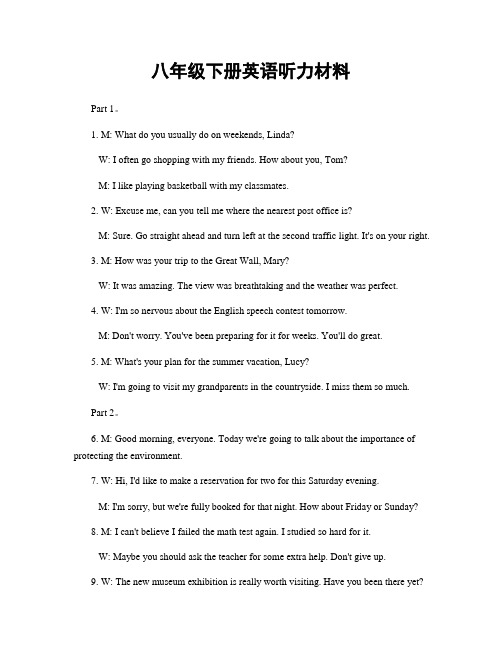
八年级下册英语听力材料Part 1。
1. M: What do you usually do on weekends, Linda?W: I often go shopping with my friends. How about you, Tom?M: I like playing basketball with my classmates.2. W: Excuse me, can you tell me where the nearest post office is?M: Sure. Go straight ahead and turn left at the second traffic light. It's on your right.3. M: How was your trip to the Great Wall, Mary?W: It was amazing. The view was breathtaking and the weather was perfect.4. W: I'm so nervous about the English speech contest tomorrow.M: Don't worry. You've been preparing for it for weeks. You'll do great.5. M: What's your plan for the summer vacation, Lucy?W: I'm going to visit my grandparents in the countryside. I miss them so much.Part 2。
6. M: Good morning, everyone. Today we're going to talk about the importance of protecting the environment.7. W: Hi, I'd like to make a reservation for two for this Saturday evening.M: I'm sorry, but we're fully booked for that night. How about Friday or Sunday?8. M: I can't believe I failed the math test again. I studied so hard for it.W: Maybe you should ask the teacher for some extra help. Don't give up.9. W: The new museum exhibition is really worth visiting. Have you been there yet?M: No, not yet. I'm planning to go this weekend. I've heard it's quite impressive.10. M: Excuse me, do you know where I can find the nearest ATM?W: Yes, there's a bank just around the corner. You can withdraw money there.Part 3。
初中英语听力材料

初中英语听力材料以下是一篇初中英语听力材料:1. Conversation at a restaurantWaitress: Good evening, how many people are in your party?Customer: Two, please.Waitress: Right this way. Here are your menus. Would you like something to drink?Customer: Yes, I’ll have a glass of red wine.Waitress: Certainly, and for you?Customer: I’ll have a beer, please.Waitress: Great, I’ll be right back with your drinks.2. Weather forecast3. Movie review4. Classroom lectureTeacher: Good morning, class. Today we’re going to talk about the Civil War and its impact on American history. The Civil War lasted from 1861 to 1865 and was fought between the North and the South. The North wanted to abolish slavery, while the South wanted to keep it. In the end, the North won and slavery was abolished. The Civil War also had a significantimpact on the economy and politics of the United States. It led to the formation of a stronger federal government and the end of state secession.5. News reportAnnouncer: In breaking news, a massive earthquake has struck the coast of Japan. The earthquake, which measured 8.9 on the Richter scale, caused widespread damage and triggered a tsunami. Buildings have collapsed, roads have been destroyed, and hundreds of people are missing. The government has declared a state of emergency and is urging citizens to evacuate to higher ground.6. Radio advertisementAnnouncer: Attention all shoppers! Don’t miss our fantastic sale on electronics at the downtown store. From TVs to smartphones to laptops, we’ve got everything you need at unbeatable prices. Hurry in now and take advantage of ourspecial discounts and financing options. This sale won’t last forever, so don’t miss out!以上是一些初中英语听力材料,涵盖了餐厅对话、天气预报、电影评论、课堂讲座、新闻报道和广告等多种场景。
中考英语听力材料
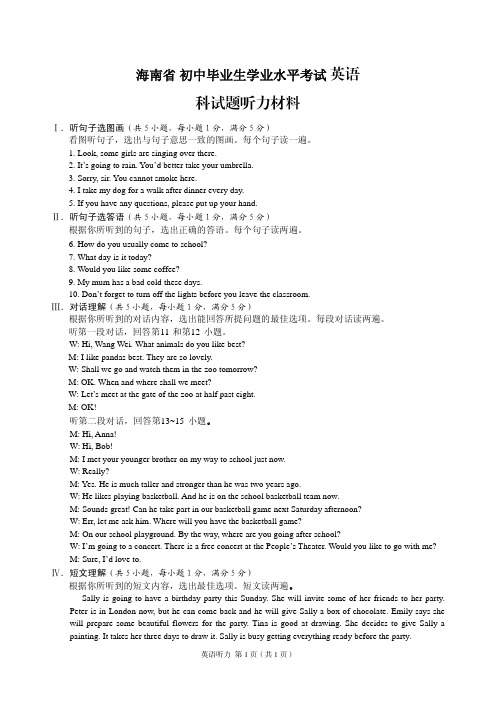
海南省初中毕业生学业水平考试英语科试题听力材料Ⅰ.听句子选图画(共5小题,每小题1分,满分5分)看图听句子,选出与句子意思一致的图画。
每个句子读一遍。
1. Look, some girls are singing over there.2. It’s going to rain. You’d better take your umbrella.3. Sorry, sir. You cannot smoke here.4. I take my dog for a walk after dinner every day.5. If you have any questions, please put up your hand.Ⅱ.听句子选答语(共5小题,每小题1分,满分5分)根据你所听到的句子,选出正确的答语。
每个句子读两遍。
6. How do you usually come to school?7. What day is it today?8. Would you like some coffee?9. My mum has a bad cold these days.10. Don’t forget to turn off the lights before you leave the classroom.Ⅲ.对话理解(共5小题,每小题1分,满分5分)根据你所听到的对话内容,选出能回答所提问题的最佳选项。
每段对话读两遍。
听第一段对话,回答第11 和第12 小题。
W: Hi, Wang Wei. What animals do you like best?M: I like pandas best. They are so lovely.W: Shall we go and watch them in the zoo tomorrow?M: OK. When and where shall we meet?W: Let’s meet at the gate of the zoo at half past eight.M: OK!听第二段对话,回答第13~15 小题。
仁爱版英语九年级上册听力材料
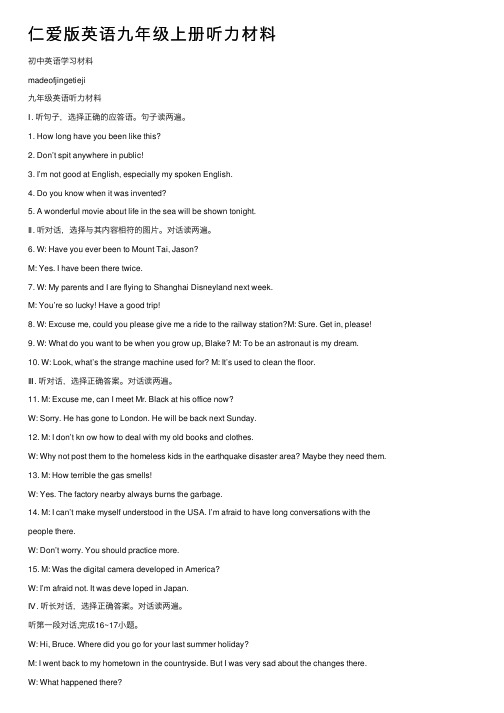
仁爱版英语九年级上册听⼒材料初中英语学习材料madeofjingetieji九年级英语听⼒材料Ⅰ. 听句⼦,选择正确的应答语。
句⼦读两遍。
1. How long have you been like this?2. Don’t spit anywhere in public!3. I’m not good at English, especially my spoken English.4. Do you know when it was invented?5. A wonderful movie about life in the sea will be shown tonight.Ⅱ. 听对话,选择与其内容相符的图⽚。
对话读两遍。
6. W: Have you ever been to Mount Tai, Jason?M: Yes. I have been there twice.7. W: My parents and I are flying to Shanghai Disneyland next week.M: You’re so lucky! Have a good trip!8. W: Excuse me, could you please give me a ride to the railway station?M: Sure. Get in, please!9. W: What do you want to be when you grow up, Blake? M: To be an astronaut is my dream.10. W: Look, what’s the strange machine used for? M: It’s used to clean the floor.Ⅲ. 听对话,选择正确答案。
对话读两遍。
11. M: Excuse me, can I meet Mr. Black at his office now?W: Sorry. He has gone to London. He will be back next Sunday.12. M: I don’t kn ow how to deal with my old books and clothes.W: Why not post them to the homeless kids in the earthquake disaster area? Maybe they need them.13. M: How terrible the gas smells!W: Yes. The factory nearby always burns the garbage.14. M: I can’t make myself understood in the USA. I’m afraid to have long conversations with the people there.W: Don’t worry. You should practice more.15. M: Was the digital camera developed in America?W: I’m afraid not. It was deve loped in Japan.Ⅳ. 听长对话,选择正确答案。
初中英语听力练习原文材料
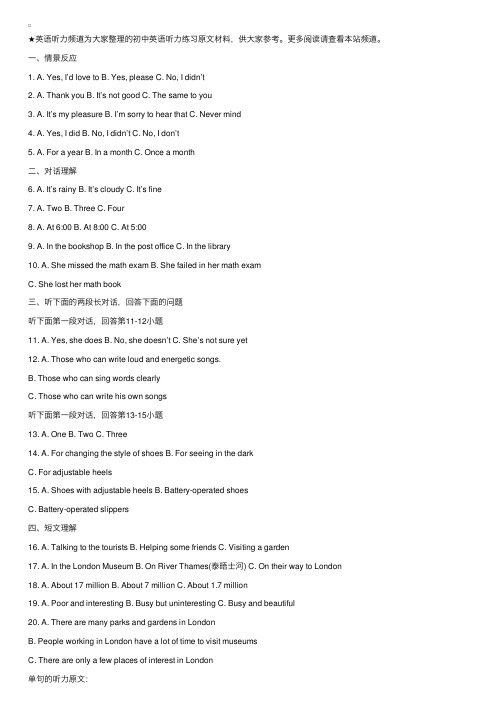
★英语听⼒频道为⼤家整理的初中英语听⼒练习原⽂材料,供⼤家参考。
更多阅读请查看本站频道。
⼀、情景反应1. A. Yes, I’d love to B. Yes, please C. No, I didn’t2. A. Thank you B. It’s not good C. The same to you3. A. It’s my pleasure B. I’m sorry to hear that C. Never mind4. A. Yes, I did B. No, I didn’t C. No, I don’t5. A. For a year B. In a month C. Once a month⼆、对话理解6. A. It’s rainy B. It’s cloudy C. It’s fine7. A. Two B. Three C. Four8. A. At 6:00 B. At 8:00 C. At 5:009. A. In the bookshop B. In the post office C. In the library10. A. She missed the math exam B. She failed in her math examC. She lost her math book三、听下⾯的两段长对话,回答下⾯的问题听下⾯第⼀段对话,回答第11-12⼩题11. A. Yes, she does B. No, she doesn’t C. She’s not sure yet12. A. Those who can write loud and energetic songs.B. Those who can sing words clearlyC. Those who can write his own songs听下⾯第⼀段对话,回答第13-15⼩题13. A. One B. Two C. Three14. A. For changing the style of shoes B. For seeing in the darkC. For adjustable heels15. A. Shoes with adjustable heels B. Battery-operated shoesC. Battery-operated slippers四、短⽂理解16. A. Talking to the tourists B. Helping some friends C. Visiting a garden17. A. In the London Museum B. On River Thames(泰晤⼠河) C. On their way to London18. A. About 17 million B. About 7 million C. About 1.7 million19. A. Poor and interesting B. Busy but uninteresting C. Busy and beautiful20. A. There are many parks and gardens in LondonB. People working in London have a lot of time to visit museumsC. There are only a few places of interest in London单句的听⼒原⽂:1.Would you like to play football with me?2.Your pants are beautiful.3.Thank you for helping me with my math.4.Do you often play computer games?5.How often do you go to see your grandparents?对话的听⼒原⽂:第6段听⼒材料It's sunny and warm now. But the radio says, it will get windy, and cloudy tomorrowI hope not. Tomorrow we will hold a sports meeting, on the playgroundQuestion: what's the weather like today?第7段听⼒材料Did you go to the film last Sunday?Yes, I went with my parents,and my brother JerryQuestion: how many people went to the film?第8段听⼒材料When do you usually get up?I usually get up at six. But I got up late today. I slept late. I get up at eight.Question: What time did the woman get up today?第9段听⼒材料Can I help you?Yes, please.I want to borrow a science bookQuestion: where are they?第10段听⼒材料Hi, Jenny, you look unhappy, what's the matter?I didn't pass the math examQuestion: what happened to Jenny?对话或独⽩的听⼒原⽂:第11段听⼒材料回答第11~12题。
中考英语听力训练材料(含答案解析)
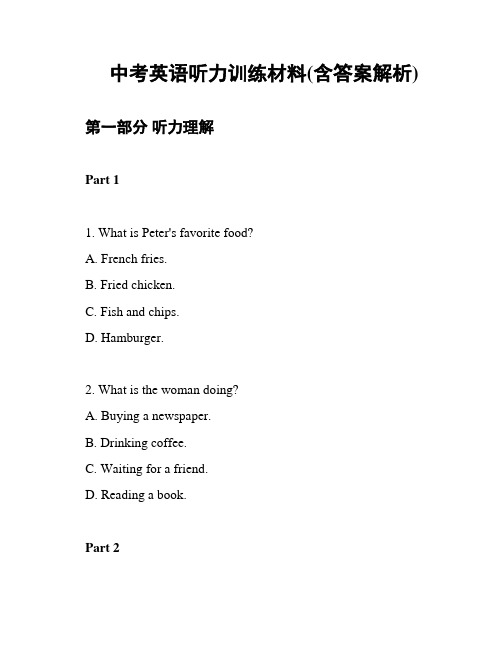
中考英语听力训练材料(含答案解析)第一部分听力理解Part 11. What is Peter's favorite food?A. French fries.B. Fried chicken.C. Fish and chips.D. Hamburger.2. What is the woman doing?A. Buying a newspaper.B. Drinking coffee.C. Waiting for a friend.D. Reading a book.Part 23. What is the relationship between the speakers?A. Teacher and student.B. Doctor and patient.C. Boss and employee.D. Mother and son.4. What is the woman's problem?A. She lost her phone.B. She doesn't understand the directions.C. She doesn't have enough money.D. She doesn't have a phone.Part 35. What does the man suggest they do?A. Go to the beach.B. Go shopping.C. Go to the movies.D. Go to the park.6. What does the woman think of the suggestion?A. She doesn't like it.B. She thinks it's a good idea.C. She has another idea.D. She's not sure.第二部分听力技能Part 17. How long has the man been studying Chinese?A. One year.B. Two years.C. Three years.D. Four years.8. What did the woman do last weekend?A. She watched a movie.B. She went shopping.C. She went to a concert.D. She visited a museum.Part 29. What does the man suggest the woman do first?A. Take a shower.B. Brush her teeth.C. Change her clothes.D. Have breakfast.10. What does the woman want to do after breakfast?A. Go shopping.B. Go for a walk.C. Listen to music.D. Watch TV.答案解析1. C:由于该题信息是在具体品种的介绍后出现,需要同学们对听取的文本有足够的理解和记忆才能听出来。
初中英语听力训练材料与答案
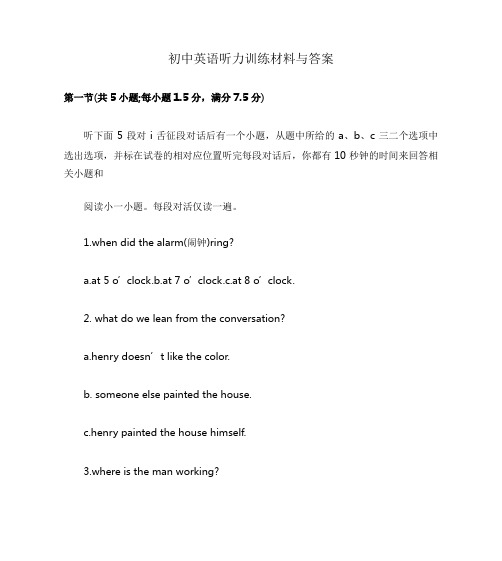
初中英语听力训练材料与答案第一节(共5小题;每小题1.5分,满分7.5分)听下面5段对i舌征段对话后有一个小题,从题中所给的a、b、c三二个选项中选出选项,并标在试卷的相对应位置听完每段对话后,你都有10秒钟的时间来回答相关小题和阅读小一小题。
每段对活仅读一遍。
1.when did the alarm(闹钟)ring?a.at 5 o’clock.b.at 7 o’clock.c.at 8 o’clock.2. what do we lean from the conversation?a.henry doesn’t like the color.b. someone else painted the house.c.henry painted the house himself.3.where is the man working?a.in a beer shop.b. in a bus station.c. in a restaurant.4.what does the woman mean?a.they don’t have many tickets.b.it is bard for them to get any tickets.c.all the tickets are sold out.5.how will the couple get home?a.they will walk home.b.they will take a taxi.c.they will take the subway(地铁).第二节(共15小题;每小题1.5分,满分22.5分)听下面五段对话或独白每段对话或独白后有儿个小题,从每题所给的a,b,c只个选项中选出选项,并标在试卷的相对应位置。
听每段对话或独白前,你将有时间阅读各个小题,每小题5秒钟;听完后,各小题将给出5秒钟的作答时间:。
每段对话或独白读两遍。
听第6段材料,回答第6至7题。
初中英语教材听力人教版

初中英语教材听力人教版篇一:14-15 中学教材八年级英语上(人教版)听力材料UNIT 1Section A1b Listen and number the people in the picture [1-5]. Conversation 1Xiang Hua: Hey, Tina. Where did you go on vacation? Tina: I went to the mountains with my family. Xiang Hua: Did everyone have a good time? Tina: Oh, yes. Everything was excellent. Wheredid you go, Xiang Hua?Xiang Hua: I went to New York City. Conversation 2Girl: What did you do on vacation, Sally? Sally: Nothing. I just stayed at home.Girl: And did you do anything interesting, Bob?Bob: Yes. I visited my uncle. We went fishing, butwe didn’t get any fish. Conversation 3Boy: Did you go anywhere on vacation, Tom? Tom: I went to summer camp. Boy: Did you go with anyone?Tom: Yes. I went with my friends. Everyone had agreat time.2a Listen. Where did the people go on vacation? Complete the chart. Conversation 1Boy: Where did you go on vacation, Grace? Grace: Iwent to New York City.Boy: Oh, really? Did you go with anyone? Grace: Yes. I went with my mother. Boy: Did you go to Central Park? Grace: Yes, I did. It was really nice. Boy: Did youbuy anything special?Grace: Yes. I bought something for my father. Boy: Oh, really? What? Grace: I bought him a hat. Conversation2Girl: Where did you go on vacation, Kevin? Kevin: I went to the beach.Girl: Oh, that’s nice. Did you play volleyball? Kevin: No, I didn’t.Girl: Well, did you swim?Kevin: Yes, I did. The water was really warm.Girl: How was the food?Kevin:(转载于: 小龙文档网:初中英语教材听力人教版) Everything tasted really good! Girl: Did you meet anyone interesting?Kevin: Yes. I met some very interesting people. Conversation 3Boy: Where did you go on your vacation, Julie? Julie:I stayed at home.Boy: Oh. So, did you do anything interesting? Julie: No, I didn’t.Boy: Did you study for your tests? Julie: Yes, I did.Boy: Did you go out with anyone?Julie: No. No one was here. Everyone was on vacation.2b Listen again. Check (√) Yes, I did or No, Ididn’t for each question.Conversation 1Boy: Where did you go on vacation, Grace? Grace: Iwent to New York City.Boy: Oh, really? Did you go with anyone? Grace: Yes. I went with my mother. Boy: Did you go to Central Park? Grace: Yes, I did. It was really nice. Boy: Did youbuy anything special?Grace: Yes. I bought something for my father. Boy: Oh, really? What? Grace: I bought him a hat. Conversation 2Girl: Where did you go on vacation, Kevin? Kevin: I went to the beach.Girl: Oh, that’s nice. Did you play volleyball? Kevin: No, I didn’t.Girl: Well, did you swim?Kevin: Yes, I did. The water was really warm. Girl: How was the food?Kevin: Everything tasted really good! Girl: Did you meet anyone interesting?Kevin: Yes. I met some very interesting people. Conversation 3Boy: Where did you go on your vacation, Julie? Julie: I stayed at home.Boy: Oh. So, did you do anything interesting?Julie: No, I didn’t.Boy: Did you study for your tests? Julie: Yes, I did.Boy: Did you go out with anyone?Julie: No. No one was here. Everyone was on vacation.Section B1c Listen. Lisa is talking about her vacation. Answer the questions.Girl: Hi, Lisa. How was your vacation?Lisa: It was great! I went to Hong Kong with myfamily.Girl: Really? Wow! Did you do anything specialthere?Lisa: Well, we went to a fun park. It was reallyexciting.Girl: Did you go shopping? Lisa: Yeah, I did.Girl: How were the stores?Lisa: Oh, they were very expensive, but I did buysomething for my best friend.Girl: And how were the people? Were they friendly? Lisa: Yeah, they were really friendly. My parentshave some friends there, and we had dinner at their house.Girl: How was the food?Lisa: It was delicious. I loved their home cooking. Girl: Did everyone have a good time?Lisa: Oh, yes, we did. Everything was excellent.1d Listen again. Fill in the blanks. Girl: Hi, Lisa. How was your vacation?Lisa: It was great! I went to Hong Kong with myfamily.Girl: Really? Wow! Did you do anything specialthere?Lisa: Well, we went to a fun park. It was reallyexciting.Girl: Did you go shopping? Lisa: Yeah, I did.Girl: How were the stores?Lisa: Oh, they were very expensive, but I did buysomething for my best friend.Girl: And how were the people? Were they friendly? Lisa: Yeah, they were really friendly. My parentshave some friends there, and we had dinner at their house.Girl: How was the food?Lisa: It was delicious. I loved their home cooking. Girl: Did everyone have a good time?Lisa: Oh, yes, we did. Everything was excellent.UNIT 2Section A1b Listen and write the activities next to the correct frequency words.Reporter: What do you usually do on weekends? Girl 1: I sometimes go shopping.Boy 1: I never go shopping. I usually watch TV. Boy 2: I always exercise.Girl 2: I often help with housework. Reporter: How about you? Girl 3: I hardly ever watch TV. I always read. Reporter: Oh, why is that?Girl 3: Oh, I don’t know. I guess I just like books.2a Listen. Cheng Tao is talking about how often he does these activities. Number theactivities [1-5] in the order you hear them.Reporter: So, Cheng Tao, how often do you watchTV?Cheng Tao: Hmm...about twice a week, I guess.Reporter: Uh-huh. And how often do you read?Cheng Tao: Oh, I read every day at school!Reporter: How often do you go to the movies?Cheng Tao: Uh...let me see...maybe once a month?Reporter: How often do you exercise?Cheng Tao: Oh, I exercise about three times a week.Reporter: How often do you shop?Cheng Tao: Shop? I shop about...about twice a month.2b Listen again. Match the activities in 2a with how often Cheng Tao does them. Reporter: So, Cheng Tao, how often do you watch TV? Cheng Tao: Hmm...about twice a week, I guess. Reporter: Uh-huh. And how oftendo you read? Cheng Tao: Oh, I read every day at school! Reporter: How often do you go to the movies? Cheng Tao: Uh...let me see...maybe once a month?Reporter: How often do you exercise? Cheng Tao: Oh, I exercise about three times a week. Reporter: How often do you shop? Cheng Tao: Shop? I shop about...about twice a month.Section B1c Listen to an interview about two people’sdaily habits. your answer to each question. Interviewer: Hi, Tina and Bill. Let’s start with thefirst question. How often do you exercise?Tina: Every day. Bill: Hardly ever.Interviewer: How often do you eat vegetables andfruit?Tina: I eat vegetables and fruit every day.Bill: I sometimes eat vegetables. But I never eatfruit. Interviewer: OK. How many hours do you sleepevery night?Tina: Nine. Bill: Me, too.Interviewer: How often do you drink milk? Bill: Never.I can’t stand milk.Tina: Oh, I love milk—I drink it every day.Interviewer: How often do you eat junk food? Bill: I eat it three or four times a week.Tina: I guess I eat it two or three times a week. Interviewer: And how often do you drink coffee? Bill: Oh, I drink coffee four times a day. Tina: I never drink coffee.Interviewer: Well, thank you very much. Bill/Tina: You’re wele.1d Listen again. Fill in the blanks in the survey. Interviewer: Hi, Tina and Bill. Let’s start with thefirst question. How often do you exercise?Tina: Every day. Bill: Hardly ever.Interviewer: How often do you eat vegetables and fruit?Tina: I eat vegetables and fruit every day.Bill: I sometimes eat vegetables. But I never eat fruit. Interviewer: OK. How many hours do you sleepevery night?Tina: Nine. Bill: Me, too.Interviewer: How often do you drink milk? Bill: Never.I can’t stand milk.Tina: Oh, I love milk—I drink it every day.Interviewer: How often do you eat junk food?篇二:人教版九年级中考英语听力材料2016年上期期中九年级质量监测英语听力材料第一节(共5小题,每小题1分,满分5分)听下面五段对话。
一年级初中英语听力材料
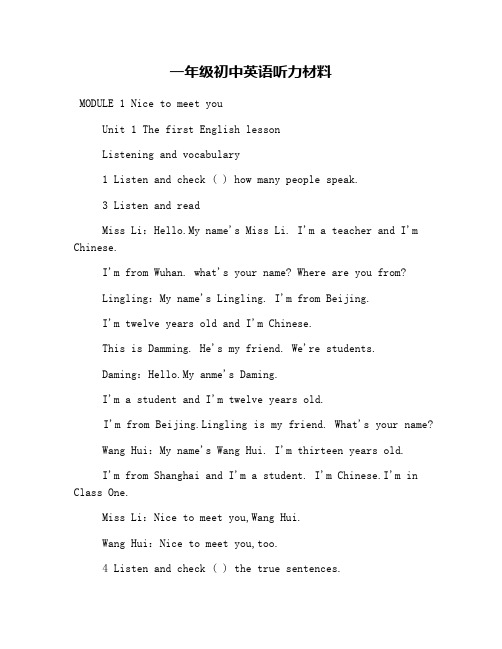
一年级初中英语听力材料MODULE 1 Nice to meet youUnit 1 The first English lessonListening and vocabulary1 Listen and check ( ) how many people speak.3 Listen and readMiss Li:Hello.My name's Miss Li. I'm a teacher and I'm Chinese.I'm from Wuhan. what's your name? Where are you from?Lingling:My name's Lingling. I'm from Beijing.I'm twelve years old and I'm Chinese.This is Damming. He's my friend. We're students.Daming:Hello.My anme's Daming.I'm a student and I'm twelve years old.I'm from Beijing.Lingling is my friend. What's your name?Wang Hui:My name's Wang Hui. I'm thirteen years old.I'm from Shanghai and I'm a student. I'm Chinese.I'm in Class One.Miss Li:Nice to meet you,Wang Hui.Wang Hui:Nice to meet you,too.4 Listen and check ( ) the true sentences.Vocabulary and pronunciation6 Listen and repeat.7 Listen and repeat. Can you see these in your classroom? Unit 2 I'm from China and I'm Chinese.Speaking and reading2 Read the passage and check ( ) the true sentences.My name's Daming and I'm in Class One.I'm from China and I'm Chinese. I'm from Beijing.Beijing is a big city.Lingling's in my class. She's my friendMy name's Lingling.I'm not from England and I'm not English.I'm Chinese. I'm in Class One.Daming is my friend.We're twelve years old.He's from Beijing and he's in my class.We're good friends.My name's Wang Hui and I'm Chinese.I'm not from Beijing.I'm from S Shanghai. I'm thirteen years old.I'm in Class One with Daming and Lingling. They are my friends.1 Daming is in Class Two.2 Daming isn't from Beijing.3 Lingling isn't English.4 Lingling and Daming aren't good friends.5 Wang Hui is Chinese.6 Daming and Wang Hui are English.。
初中英语听读空间中考特辑一听力材料
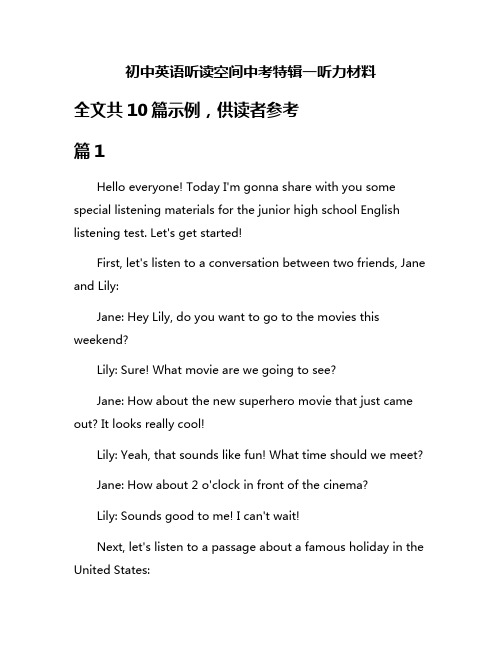
初中英语听读空间中考特辑一听力材料全文共10篇示例,供读者参考篇1Hello everyone! Today I'm gonna share with you some special listening materials for the junior high school English listening test. Let's get started!First, let's listen to a conversation between two friends, Jane and Lily:Jane: Hey Lily, do you want to go to the movies this weekend?Lily: Sure! What movie are we going to see?Jane: How about the new superhero movie that just came out? It looks really cool!Lily: Yeah, that sounds like fun! What time should we meet?Jane: How about 2 o'clock in front of the cinema?Lily: Sounds good to me! I can't wait!Next, let's listen to a passage about a famous holiday in the United States:Narrator: Thanksgiving is a special holiday celebrated in the United States on the fourth Thursday of November. It is a time when people gather with their families and friends to give thanks for all the good things in their lives. The traditional Thanksgiving meal includes turkey, stuffing, cranberry sauce, and pumpkin pie. Many people also watch American football games on TV and participate in parades. It is a time of gratitude and sharing with loved ones.Now, let's listen to a short story about a boy named Tim who goes on a camping trip with his friends:Tim: I'm so excited to go camping with my friends this weekend! We're going to sleep in tents, go hiking, and cook our own food over a campfire. It's going to be so much fun!Friend 1: I can't wait to roast marshmallows and tell spooky stories around the campfire!Friend 2: Me too! I heard there's a beautiful lake nearby where we can swim and fish.Tim: I hope we see some wildlife like deer or rabbits while we're out hiking. It's going to be an adventure!That's all for today's special junior high school English listening materials. I hope you enjoyed listening and have a great day! Bye!篇2Hello everyone! Today I'm going to share with you some tips and tricks for the listening section of the junior high school English exam.Tip 1: Practice makes perfect! Make sure to listen to English every day, whether it's through music, movies, or podcasts. The more you listen, the better you will become at understanding the spoken language.Tip 2: Pay attention to key words. During the exam, listen carefully for key words or phrases that will help you understand the main idea of the passage. These key words will guide you in answering the questions correctly.Tip 3: Take note of the speaker's tone and intonation. This can give you clues about the speaker's feelings or attitudes, which can help you understand the context of the passage better.Tip 4: Don't panic if you miss a word or phrase. Instead, focus on the overall meaning of the passage and make an educated guess based on what you do understand.Tip 5: Practice, practice, practice! The more you practice listening to English, the more comfortable you will become with the language. Try listening to different accents and speeds to prepare yourself for any kind of listening material.Remember, the key to success in the listening section is to stay calm, focused, and to practice as much as you can. Good luck on your exam!篇3Hello everyone! Today, I want to share some tips and tricks for the listening section of the junior high school English exam. Listening can be a bit tricky, but with a little practice and some helpful strategies, you can ace this part of the test!First of all, it's important to stay focused during the listening exercises. Make sure you are in a quiet environment where you can hear the audio clearly. Pay attention to the instructions given before each section, as they will help you understand what you need to do.Next, try to anticipate what the speakers will talk about. Look at the questions before you listen to the audio, so you have an idea of what information to listen for. This can help you stay alert and focused on the key points.During the listening exercises, don't panic if you miss some information. Try to catch as much as you can, and make educated guesses if needed. Remember, the more you practice, the better you will become at understanding spoken English.After you finish listening to the audio, take a moment to review your answers. Make sure you have answered all the questions and check for any mistakes. If you are unsure about an answer, trust your instincts and go with your gut feeling.Lastly, don't forget to practice regularly! Listening to English songs, podcasts, or watching English movies can help you improve your listening skills and prepare you for the exam.With these tips in mind, I'm sure you will do great on the listening section of the junior high school English exam. Good luck, and happy listening!篇4Hello everyone! Today I'm going to share with you some special listening materials for the junior high school English listening exam. These materials are designed to help you improve your listening skills and prepare for the exam!Listening Material 1: Describing PeopleListen to the following description and answer the questions that follow:My friend Mary is tall and slim. She has long brown hair and green eyes. She is very friendly and always has a smile on her face. She likes to wear colorful clothes and is always ready to help others.Questions:1. What is Mary's hair color?2. How would you describe Mary's personality?3. What kind of clothes does Mary like to wear?Listening Material 2: Making PlansListen to the dialogue and fill in the missing information:A: What do you want to do this weekend?B: I'm not sure. Maybe we could go to the movies?A: That sounds like a good idea. What movie do you want to see?B: I heard there's a new action movie coming out. Let's check the showtimes and decide.Missing Information:1. What do the speakers want to do this weekend?2. What kind of movie does speaker B want to see?3. What do they need to do next to make a decision?Listening Material 3: Giving DirectionsListen to the following directions and answer the questions:You will see a post office on your left. Take the first right after the post office and continue straight for two blocks. Turn left at the intersection and you will see the library on your right.Questions:1. What do you see on your left?2. How many blocks do you need to go straight?3. Where is the library located?Listening Material 4: Buying FoodListen to the conversation and answer the questions:A: Hi, I'd like to order a pizza for delivery.B: Sure, what size and toppings would you like?A: I'll take a large pizza with pepperoni and mushrooms, please.B: Okay, that will be $15. How would you like to pay?Questions:1. What size pizza does the customer want?2. What toppings does the customer want on the pizza?3. How much does the pizza cost?I hope you found these listening materials helpful! Remember to practice listening to English as much as possible to improve your skills. Good luck on your junior high school English listening exam!篇5Title: Special Edition of Junior High School English Listening Space ExamHey guys! Are you ready for some super cool tips for the junior high school English listening exam? Here we go!First, make sure you practice listening to English as much as possible. You can listen to English songs, watch English movies, or even chat with your friends in English. The more you listen, the better you'll get at understanding spoken English.Next, when you're taking the listening exam, make sure you pay attention to the different accents and pronunciations. Sometimes the speakers might have a British accent, or an American accent, and it's important to be able to understand both.Also, listen for key words and phrases that can help you understand the main idea of the conversation or passage. If you're not sure about a word, try to guess the meaning based on the context.During the exam, don't panic if you miss a question. Just keep listening and focus on the next one. Remember, you can always go back and try to answer it later.Lastly, practice, practice, practice! The more you practice listening to English, the more confident you'll feel on exam day.Good luck, everyone! You've got this!篇6Hello everyone! Today I’m going to share with you some tips on how to do well in the listening section of the junior high school English exam. Listening can be tricky, but with a little practice and some helpful hints, you’ll be able to ace this part of the test!First of all, it’s important to pay attention to the instructions. The teacher will tell you how many times a conversation or a passage will be played, so listen carefully. If you miss any information during the first play, don’t worry! You’ll have a chance to listen again.Secondly, familiarize yourself with common question types. There are usually multiple-choice questions, fill-in-the-blank questions, and questions asking for specific details. Make sure you understand what each question is asking for before you listen to the recording.Next, try to predict the answers. Before the recording starts, take a moment to think about what the conversation or passage might be about. This will help you focus on relevant information while listening.During the listening, don’t get overwhelmed by unfamiliar words. If you encounter a word you don’t know, try to guess its meaning from the context. Remember, you don’t need to understand every single word to answer the questions correctly.Lastly, practice, practice, practice! The more you listen to English conversations and passages, the better you’ll become at understanding and answering questions. You can listen to English songs, watch English movies, or even do practice tests online.By foll owing these tips and putting in some effort, I’m sure you’ll improve your listening skills and do great on the junior high school English exam. Good luck, everyone!篇7Hello everyone, I'm here to share some special listening materials for the junior high school English test with you all. Get ready to tune in and sharpen your listening skills!First up, we have a conversation between two friends talking about their plans for the weekend. Listen carefully as they discuss going to the movies, hanging out at the park, and maybe even trying out a new restaurant. Pay attention to the details and try to answer the questions that follow.Next, we have a weather forecast segment where a meteorologist predicts the weather for the next week. She talks about sunny days, rainy afternoons, and even a chance of thunderstorms. Make sure to take notes on the important information and be prepared to answer questions about the forecast.Moving on, we have a news report about a new technology company that is revolutionizing the way people communicate. The reporter interviews the CEO of the company and discusses the benefits of their latest invention. Listen closely to the interview and be ready to answer questions about the new technology.Finally, we have a short story about a young girl who discovers a hidden treasure in her backyard. Listen as she describes her exciting adventure and how she plans to share her discovery with her friends. Pay attention to the details of the story and be prepared to answer questions about the girl's treasure hunt.That's all for now, I hope you enjoy listening to these special materials and that they help you prepare for your junior high school English test. Good luck, and happy listening!篇8Title: The Exciting Adventure in the Junior High English Listening SpaceHey guys! Today, I want to share with you an awesome adventure that happened in our Junior High English Listening Space. It was so cool, you won't believe it!So, our English teacher Mrs. Smith told us that we were going to listen to some special material for the upcoming middle school exams. We were all super excited and couldn't wait to start.The first listening passage was about a girl named Emily who went on a trip to the Amazon rainforest. She had to navigate through the dense jungle, avoid wild animals, and even cross a treacherous river. It was so intense! But Emily was brave and smart, and she made it through safely.The second passage was about a group of friends who were on a camping trip. They had to pitch a tent, start a fire, and cook their own meals. It sounded like so much fun! The friends laughed and joked as they enjoyed the great outdoors.The last passage was a mystery story about a stolen diamond necklace. We had to listen carefully to clues and try to figure out who the thief was. It was like being detectives! We all put on our thinking caps and tried to solve the mystery.In the end, we all had a blast listening to the material and practicing our listening skills. We felt more prepared for the upcoming exams and couldn't wait to show off what we had learned.I hope you guys enjoyed hearing about our adventure in the Junior High English Listening Space. It was so much fun and we can't wait for the next one! See you next time!篇9Hi everyone! Are you ready for the Middle School English Listening Special? Today we have some super fun listening materials for you to practice. Let's get started!Listening Part 1:Listen to the conversation between Jack and Lily about their favorite hobbies. Answer the following questions:1. What is Jack's favorite hobby?2. What is Lily's favorite hobby?3. What do Jack and Lily both enjoy doing together?Listening Part 2:Listen to the teacher talking about a school trip to the beach. Answer the following questions:1. When is the school trip?2. What are the students supposed to bring?3. What activities will the students do at the beach?Listening Part 3:Listen to a radio advertisement about a new movie theater in town. Answer the following questions:1. What is the name of the movie theater?2. When is the grand opening?3. What special promotion is the theater offering?Listening Part 4:Listen to the weather report for the upcoming weekend. Answer the following questions:1. What will the weather be like on Saturday?2. What will the weather be like on Sunday?3. What activities can people do with the weather forecast?Listening Part 5:Listen to a story about a boy and his pet dog. Answer the following questions:1. What is the boy's name?2. What is the dog's name?3. What adventures do they have together?That's all for today's special Middle School English Listening materials. We hope you had fun and learned something new. Keep practicing your listening skills and have a great day!篇10Title: Special Edition of Intermediate English Listening Materials for Middle School StudentsHey guys! Today, I'm going to share some super cool stuff with you all. It's all about intermediate English listening materials for the middle school students. Are you ready? Let's dive in!Listening Material 1:Dialogue:Sue: Hi Peter, what did you do over the weekend?Peter: Hi Sue, I went camping with my family. It was so much fun!Sue: That sounds awesome! Did you go hiking too?Peter: Yes, we hiked up a mountain and the view was amazing.Sue: Wow, I wish I could go camping too.Questions:1. Where did Peter go over the weekend?2. What activity did Peter do with his family?3. How was the view from the mountain?Listening Material 2:Dialogue:Teacher: Good morning class! Today we are going to learn about dinosaurs. They lived millions of years ago.Student 1: Were they bigger than elephants?Teacher: Yes, some dinosaurs were as big as a school bus!Student 2: Did dinosaurs eat meat or plants?Teacher: Some dinosaurs were carnivores and ate meat, while others were herbivores and ate plants.Questions:1. What are the students going to learn about today?2. How big were some dinosaurs?3. What did carnivore dinosaurs eat?Listening Material 3:Dialogue:Announcer: Welcome to the zoo! Today we have a special show featuring lions and tigers.Kid 1: I love tigers! They are so majestic.Kid 2: I prefer lions, they are the kings of the jungle.Announcer: Let's watch as the lions and tigers show off their skills.Questions:1. What animals are featured in the special show at the zoo?2. How does Kid 1 feel about tigers?3. What do lions represent in the animal kingdom?Hey guys, how was that? Did you enjoy the stories and conversations? I hope it helped you improve your listening skills in English. Keep practicing and you'll get better at it! Have a great day!。
初中英语听力
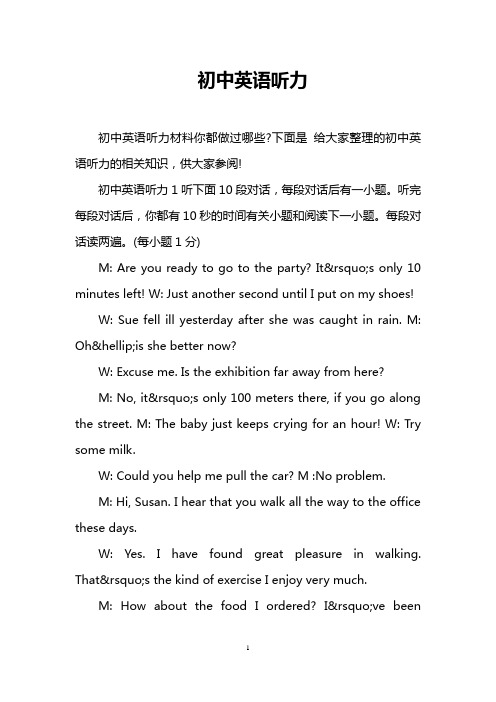
初中英语听力初中英语听力材料你都做过哪些?下面是给大家整理的初中英语听力的相关知识,供大家参阅!初中英语听力1听下面10段对话,每段对话后有一小题。
听完每段对话后,你都有10秒的时间有关小题和阅读下一小题。
每段对话读两遍。
(每小题1分)M: Are you ready to go to the party? It’s only 10 minutes left! W: Just another second until I put on my shoes!W: Sue fell ill yesterday after she was caught in rain. M: Oh…is she better now?W: Excuse me. Is the exhibition far away from here?M: No, it’s only 100 meters there, if you go along the street. M: The baby just keeps crying for an hour! W: Try some milk.W: Could you help me pull the car? M :No problem.M: Hi, Susan. I hear that you walk all the way to the office these days.W: Yes. I have found great pleasure in walking. That’s the kind of exercise I enjoy very much.M: How about the food I ordered? I’ve beenwaiting for 20 minute. W: Very sorry, sir. I’ll be back with your order in a minute.W: Excuse me, sir. I ’m going to send this parcel to London. What’s the postage for it? M: Let me see. It’s one pound and fifty.M: Mary, would you like to go to the movies with me after dinner ? W :Well, I’ll go if you really want me to, but I’m rather tired.10、M: If I were you ,I’d ride a bike to work. Takinga crowded bus during rush hours is really terrible.W: Thank you for your advice, but my bike has broken down. B)听下面两段对话和一段独白,听完第一段对话后回答第11~13小题;听完第二段对话后回答第14~16小题;听完独白后回答第17~20小题。
初中中考英语听力必练

初中中考英语听力必练语数英最为三门主课,看起来毫不相干,但三科的学习方法其实基本都是一样的,数学记公式,语文记古诗,英语记单词。
学习英语,需要把陌生的单词片语和句型语法不断的熟悉和熟练。
下面是小编给大家整理的一些初中中考英语听力的学习资料,希望对大家有所帮助。
中考英语听力材料Ⅰ.情景反应根据你所听到的内容,选择正确的应答语。
每小题读两遍。
(共5分,每小题1分)1.A. Look, I’ve bought a new watch. B. Oh, it’s still early.C. It’s a quarter to nine.2.A. That’s a good idea. Let’s make a plan for the journey.B. What do you think of it?C. The Great Wall is the longest wall in the world.3.A. It was all right. B. It was cloudy. C. It was dark.4.A. It doesn’t matter. B. Don’t be so serious.C. I’m sorry. I got up late again.5.A. Last week. B. In the library. C. Very interesting.Ⅱ.对话理解根据你所听到的对话及问题选择正确答案。
每小题读两遍。
(共10分,每小题1分)6.A. My birthday. B. Thursday. C. Friday.7.A. In the super market. B. In the classroom. C. In the cinema.8.A. She watched a table tennis match. B. She played table tennis.C. She saw a film.9.A. She is reading. B. She is writing. C. She is drawing.10.A. The report on the radio. B. The war on Iraq(伊拉克).C. The life of the president of Iraq.听下面一段长对话,回答11—12 两个小题。
初中英语听力与阅读八年级上册听力材料

初中英语听力与阅读八年级上册听力材料全文共6篇示例,供读者参考篇1My Name is AlexHi there! My name is Alex and I'm 10 years old. I'm in the 5th grade at Oakwood Primary School. Today I want to tell you all about my life as a primary school student.I wake up at 6:30am every morning because my mom has to leave for work early. I get dressed, eat a quick breakfast of cereal and fruit, and then my dad drives me to school at 7:45am. The classes start at 8:15am.My favorite subject is science because I love learning about how things work. In science class, we get to do a lot of fun experiments. Last week, we made little volcanoes out of modeling clay, baking soda and vinegar. It was so cool to watch them "erupt"! I also really enjoy art class because I love drawing, painting and working with clay.The hardest subject for me is math. I struggle a bit with fractions, decimals and word problems. But my teacher, Ms.Jenkins, is really nice and patient. She always takes extra time to explain things to me until I understand. I just have to work a little harder in math.At 11:30am, we have our lunch break. I pack a lunch from home most days - usually a sandwich, an apple, some carrots and a cookie or chips. My best friend Jacob and I always sit together at lunch. We talk about video games, sports, movies and anything else kids our age enjoy.After lunch, we have recess for 30 minutes. There's a playground with swings, slides, monkey bars and a big field where we can run around and play sports like soccer or kickball. Recess is probably my favorite part of the school day because I have so much energy and I love being active.In the afternoon, we have more classes like social studies, reading and writing. I enjoy learning about history and different cultures in social studies. In reading, we're studying a really cool book called The Chronicles of Narnia. I love the magical world and all the adventures the characters go on. For writing, we're currently working on short stories. It's fun to use my creativity and imagination.School ends at 3:15pm. My mom picks me up a couple days a week, and other days I go to my grandma's house after schoolwhile my parents are still at work. At home, I have a snack, work on any homework I have, and then I have some free time to play videogames, read or go outside until dinner.After dinner, I take a bath and then I'm allowed to watch a little TV or play on my tablet until bedtime at 8:30pm. I really cherish this downtime after a long day at school.On the weekends, I love hanging out with my friends. We have sleepovers, go to the movies, play at the park or sometimes go bowling. I'm involved with a soccer team too, so I have games or practices some weekends.Sunday nights are my least favorite because I know I have to go back to school the next day. But overall, I really like being a primary school student. My classes are interesting, my teachers are kind, and I've made some great friends. Being a kid is hard work but it's a lot of fun too!So that's a typical day and week in my life. Being a 5th grader keeps me busy but I'm enjoying this age. I'll be off to middle school before I know it! Thanks for reading about my life as an elementary student.篇2Hi everyone! My name is Alice and I'm a student in 8th grade. Today I want to tell you all about my experiences with English listening and reading this year. Get ready, because there's a lot to cover!Let me start with listening. Man, English listening can be really tough sometimes! All those different accents, the fast speech, the slang words – it's enough to make your head spin. But you know what? I've found some great ways to improve my listening over the past few months.First up, listening to English songs. I know it sounds kind of silly, but it's honestly been super helpful. At first, I could hardly make out any of the words. But as I listened to the same songs over and over again while reading the lyrics, it started to click. The rhythms and sounds became more familiar, and soon I was singing right along! Singing forces you to really listen closely to pronunciation and word forms. Give it a try if you haven't already – pick your favorite artists and jam out while studying the lyrics.Another listening tip: Watch English TV shows and movies! Again, use subtitles at first if you need them. But try to minimize the subtitles as you get more comfortable just listening. I've been obsessed with sitcoms lately because the language is pretty conversational and there's a lot of humor that relies on listeningclosely. My comprehension has improved a ton from watching shows like Friends and The Office. The different characters have such unique ways of speaking too, which helps train your ear.Podcasts are another awesome listening resource. There are so many great ones out there on every topic you can imagine. Best of all, you can listen while doing other things like chores or exercising. I've been getting into true crime podcasts recently, which are kind of spooky but really engage my listening skills with all the details and narration. Highly recommend giving podcasts a shot!As for reading, one of the biggest things I've learned is not to get hung up on words I don't know. It's so easy to get stuck wheneverthere's an unfamiliar vocabulary word and lose track of the overall meaning and context clues. I used to constantly pause and look everything up, which was exhausting. Now I try to use context to determine the gist first, and only look up words if I absolutely have to after multiple read-throughs.Expanding my English reading outside of textbooks has helped tremendously as well. Novels, magazines, websites, you name it – reading more interesting,real-world English content is way more engaging. It exposes me to diverse styles of writing and topics which really improve my comprehension and criticalthinking abilities. Some of my favorite books I've read this year include Harry Potter, The Hunger Games, and The Hate U Give. I'm obsessed!I also make sure to read out loud sometimes, which sounds silly but seriously improves my retention and fluency. Hearing and seeing the words simultaneously creates stronger connections in my brain. I record myself too so I can listen back and identify areas to improve my pacing, intonation, etc. It's Like getting personalized pronunciation practice.Those are some of my biggest tips for English listening and reading, but I'm still learning every day. There's always room for improvement! Let me know if you have any other strategies that work well for you. I'd love to hear different perspectives. Study hard and keep at it, everyone! We've got this.篇3Hi everyone! My name is Emily and I'm in the eighth grade. Today I want to talk to you about my experiences with English listening comprehension and reading over the past few years.English has always been one of my favorite subjects in school. I find it really interesting to learn about a different language and culture. When I was younger in elementary school,listening comprehension was pretty easy. The dialogues and stories were short and simple, mostly about everyday topics like family, food, hobbies and so on. The vocabulary was basic too.However, once I got to middle school, the listening materials became a lot more challenging. The passages were longer and covered more complex subjects like science, history, literature and so on. There was a lot of new academic vocabulary to learn. The speakers also started speaking faster with more natural speech patterns and idiomatic expressions.At first, I really struggled with the step up in difficulty. I would listen to a passage and only catch a few words here and there. I felt lost and discouraged. But my English teacher gave me some great tips that really helped.First, she said to listen for context clues – things like names, numbers, transitional phrases and so on that give you a sense of the main topic and how the information is organized. Once you grasp the gist, it's easier to fill in the details.She also recommended listening to the same passage multiple times, focusing on different elements each time – the introduction, conclusion, key details, etc. Repeated listening is so important for training your ear.Another useful strategy is taking good notes as you listen –jotting down key words, dates, names, unfamiliar vocabulary and so on. Having a written record helps reinforce the information.My teacher emphasized not worrying about understanding every single word too. If you miss a section, move on and refocus rather than dwelling on what you missed. Over time, the missed details tend to become clearer through context.I took my teacher's advice to heart and started using those techniques. It wasn't easy at first, but gradually my listening skills improved tremendously. I became much better at identifying main ideas, picking out important supporting details, and comprehending more complex vocabulary and linguistic structures.The reading passages were challenging in their own way too. The texts we had to analyze got much longer and denser, packed with figurative language, idiomatic expressions, complex grammar and so on.My biggest struggle was keeping everything straight –keeping track of all the characters, remembering key events and plot points, analyzing author's purpose and point of view, identifying rhetorical devices, and so on. It was a lot to process!What helped me the most was taking diligent notes as I read, writing down my thoughts, questions and reflections in the margins. I would pay close attention to the introduction and conclusion since those tend to encapsulate the main idea. I looked for signal words like "for example," "in contrast," "additionally" and so forth to understand the logical flow.I also started keeping a running vocabulary list of unfamiliar words to look up later. Knowing the precise meanings of the language was key to really comprehending the deeper meaning of the text.Another habit that served me well was reading passages multiple times – the first just for a general sense, then going back with a more critical, analytical eye. On subsequent readings I would focus on literary devices, tone, pacing and other more subtle elements.Once I implemented all those active reading strategies, my comprehension really took off. I went from just skating by to truly understanding and appreciating the material on a much deeper level.I can't say that listening and reading comprehension in English is easy, even now. It still requires diligent focus and effort. But the techniques I've learned have made me a stronger studentoverall. I feel much more confident analyzing complex texts and recordings.I'm really proud of how far my English skills have come over the years. It just goes to show that with the right strategies and hard work, anything is possible. The key is being an active, engaged learner – not just letting the information wash over you.I still have a lot more to learn, of course. English is a rich, nuanced language full of incredible diversity in vocabulary, idiomatic expressions, accents, writing styles and so on. That's what makes it so fascinating to study and master.No matter what career I pursue, I know having excellent English listening and reading comprehension will serve me well. Those are invaluable skills for effectively communicating, analyzing information critically, and understanding different perspectives.So those are my experiences and tips so far. Let me know if anyone has questions! I'm always happy to discuss my journey and maybe we can swap strategies. Thanks for listening, everyone!篇4Hi everyone! My name is Emily and I'm a student in 8th grade. Today I want to tell you all about my experience learning English over the past few years. Get ready, because this is going to be a long story!I'll start from the very beginning. When I was in 3rd grade, my parents decided it would be really important for me to learn English from an early age. They wanted me to have an advantage when applying for good high schools and universities later on. So they enrolled me in an after-school English program.At first, I absolutely hated going to English class after my regular school day was over. I was exhausted and just wanted to go home and play. The lessons seemed so boring - learning the English alphabet, simple vocabulary words like "apple" and "book", and really basic phrases. I remember thinking English was the worst and didn't understand why I needed to learn another language.But my parents kept encouraging me to stick with it. They said being bilingual opens up so many opportunities in life. I'm really glad they pushed me, because after a few months, English class started getting more interesting. We began reading simple storybooks and watching cartoons in English. Slowly but surely, I started picking it up.By the time I got to 4th grade, my English skills had improved a lot. I could understand most of what my English teachers said during class. Reading children's books was pretty easy. And I could introduce myself, talk about my family, and discuss my hobbies in English, although I still made a lot of mistakes with grammar and pronunciation.That whole year, we spent a lot of time working on conversation skills. We did roleplays where we pretended to order food at a restaurant, go shopping, and other daily situations. Looking back, it was pretty silly, but it really helped me get comfortable speaking English out loud. I also loved the games and songs we used to practice vocabulary.In 5th grade, things started getting more challenging in English class. We had started learning how to write simple paragraphs and essays. We also read more advanced storybooks like folklore tales from different cultures. I remember learning about stuff like Johnny Appleseed, Paul Bunyan, and some Greek myths. My writing abilities were still pretty bad, but my reading comprehension was getting better day by day.That year we also started learning about English-speaking cultures and customs. I found it fascinating to learn about holidays like Christmas, Halloween, and Thanksgiving that aren'tcelebrated in my own country. We watched videos about English-speaking countries and even had a "culture day" where we tried food from places like America, Britain, Australia, and India. Getting that cultural exposure definitely motivated me to keep working hard at English.Then came 6th grade, which was a really pivotal year for my English learning. We had relocated to a new city over the summer, so I switched to a new school. The English program at my new school was much more intensive than what I was used to. We were expected to read short novels and stories in English, write multi-paragraph essays, and really work on our listening skills.It was so hard at first that I almost gave up. I remember crying out of frustration many days because I couldn't understand what we were reading or the instructions my English teacher gave. My parents had to hire a tutor to come over twice a week to help me catch up. But eventually, through a lot of perseverance and hard work, everything started clicking into place.Looking back on 6th grade, I'm so glad I stuck it out despite wanting to quit English so many times. By the end of that year, I was having conversations in English with minor mistakes,reading at an 8th grade level, and writing five-paragraph persuasive essays. I had come so incredibly far from just learning the alphabet a few years prior.Last year in 7th grade, English class was still challenging but not nearly as overwhelming as 6th grade had been. We focused a lot on more advanced writing skills like literary analysis. We read classics like To Kill A Mockingbird and The Outsiders and had to write essays analyzing the major themes. We also practiced lots of different forms of writing like narratives, research papers, and poems.My listening abilities also improved tremendously thanks to a great curriculum that incorporated audio books, podcasts, English movies and篇5Hi there! My name is Emily, and I'm a 13-year-old student in the 8th grade. Today, I want to share with you a story about my summer vacation last year. It was an adventure that taught me a valuable lesson about friendship and accepting others.During the first few weeks of summer, I was feeling a bit bored and restless. All my friends were away on family trips, and I was stuck at home with nothing much to do. That's when mymom suggested that I sign up for the local summer camp. At first, I wasn't too excited about the idea, but after some persuasion, I decided to give it a try.On the first day of camp, I was nervous and a little shy. I didn't know anyone there, and I worried that I wouldn't make any friends. As I walked into the camp grounds, I noticed a group of girls sitting together, laughing and chatting. They seemed like they were already best friends, and I felt a little intimidated.That's when I met Sarah. She was a friendly girl who introduced herself to me and invited me to join their group. I was hesitant at first, but Sarah's warm smile and welcoming attitude made me feel more at ease.Over the next few days, I started to open up and participate in the camp activities with the group. We played games, went on hikes, and even learned how to make friendship bracelets. Sarah was always by my side, encouraging me and making me feel included.One day, during a team-building exercise, we were paired up with another group of campers. That's when I met Aisha. She was a quiet girl who seemed a little shy and reserved. The other girls in our group seemed to ignore her, and I could sense that she felt left out.Sarah noticed this too, and she made an effort to include Aisha in our activities. She would ask her questions and make sure she was comfortable. At first, Aisha was hesitant to open up, but slowly, she started to participate and even cracked a few smiles.As the days went by, I realized that Aisha was actually a really cool person. She was talented at arts and crafts, and she had a great sense of humor once she felt more comfortable. I started to feel bad for judging her based on her initial shyness.One day, during a campfire night, Sarah brought up the topic of friendship and acceptance. She talked about how it's important to be kind and inclusive to everyone, regardless of their differences. She encouraged us to step out of our comfort zones and get to know people who might seem different from us.That night, I had a realization. I had almost missed out on getting to know Aisha because of my own preconceptions and judgments. I vowed to be more open-minded and accepting of others, no matter how different they might seem at first.From that day on, our group became inseparable. We laughed together, shared stories, and supported each other through the challenges of camp life. Sarah's kindness andacceptance had brought us all together, and I was grateful for her friendship.As the summer came to an end, I realized that I had learned a valuable lesson. True friendship isn't about judging others or only surrounding yourself with people who are just like you. It's about being open-minded, accepting differences, and giving everyone a chance to show their true selves.That summer camp experience changed me for the better. I became more confident, more accepting, and more appreciative of the diversity of people around me. And it all started with Sarah's simple act of kindness and inclusion.So, my friends, remember to always be kind and welcoming to others, no matter how different they might seem. You never know the amazing friendships and life lessons that might come your way when you open your heart and embrace diversity.篇6My English Class AdventuresEnglish class has always been one of my favorite subjects in school. I find the language so fascinating and love learning about different cultures through reading materials and listeningexercises. This year in 8th grade, our first semester English textbook has some really cool stuff!One of the listening exercises we did was about a boy named Jack who went on a camping trip with his family. The audio described all the preparations they made like packing tents, sleeping bags, cooking supplies, and hiking gear. It was fun to listen for vocabulary words related to camping that I had learned. When they got to the campsite, the narrator vividly described the sights and sounds of the forest. You could almost smell the pine trees! Some challenges Jack faced included putting up the tent properly and building a campfire. His little sister wasn't too thrilled about sleeping outdoors at first. But by the end, the whole family had an amazing bonding experience. Listening to dialogues like this really helps me practice my comprehension skills.Another cool unit was on extreme sports. We read some articles profiling daring athletes who participate in activities like rock climbing, bungee jumping, and white water rafting. The writers described the gear and equipment needed for each sport in great detail. There were also harrowing tales of narrow escapes and times when the athletes really had to dig deep for courage and perseverance. Some of the descriptions were sointense, it felt like I was there! I have a lot of respect for those who pursue such adventures, even though I'm more of a calm, indoor activity kind of person. The readings pushed me to infer meanings from context clues for much of the advanced vocabulary.My personal favorite was a unit on international cuisines. The readings and listenings highlighted signature dishes from all around the world - China, Mexico, India, Italy, Morocco, and more. They broke down the key ingredients and traditional cooking methods. My mouth waters just thinking about it! One of the listening passages was an interview with a chef who specializes in fusion cuisine. That's where you blend flavors from multiple culinary traditions. He described some innovative crossover dishes he created by combining techniques and components from different regions. It all sounded so creative and delicious. I asked my mom if we could try making some of the recipes at home on our next free weekend!Not everything in the textbook was fun and games though. We also covered some more serious topics like natural disasters and environmental protection. Through reading first-hand accounts, I learned what it's like to experience events like earthquakes, tsunamis, and volcanic eruptions. While incrediblydevastating, the resilience of the human spirit always shines through. On the environmental front, we examined how factors like pollution, deforestation, and overpopulation pose threats to delicate ecosystems around the globe. It made me feel fortunate for what I have, while also inspiring me to find ways to reduce my carbon footprint. Some of those listening passages featuring activist speakers were quite moving.Overall, this semester's materials have been very engaging and opened my eyes to so many fascinating realities about the world. My English skills haveleveled up for sure, but more importantly, I feel like a more worldly person with greater cross-cultural understanding. Vocabulary and grammar are great, but that broader awareness is the true gift of language learning. I'm already looking forward to the wonders that await me next semester!。
初三听力训练资源推荐
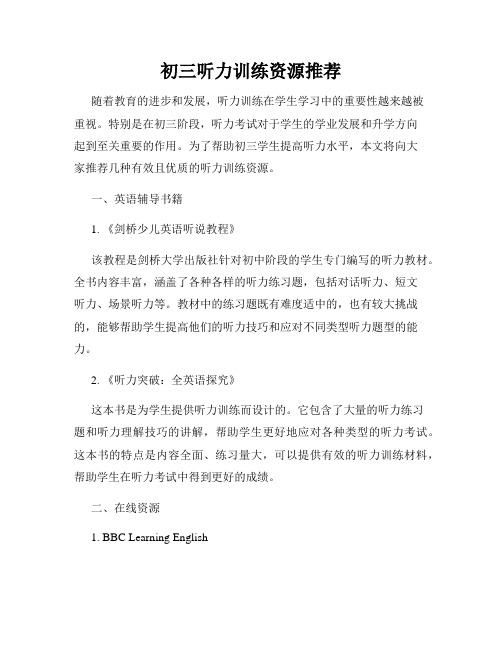
初三听力训练资源推荐随着教育的进步和发展,听力训练在学生学习中的重要性越来越被重视。
特别是在初三阶段,听力考试对于学生的学业发展和升学方向起到至关重要的作用。
为了帮助初三学生提高听力水平,本文将向大家推荐几种有效且优质的听力训练资源。
一、英语辅导书籍1. 《剑桥少儿英语听说教程》该教程是剑桥大学出版社针对初中阶段的学生专门编写的听力教材。
全书内容丰富,涵盖了各种各样的听力练习题,包括对话听力、短文听力、场景听力等。
教材中的练习题既有难度适中的,也有较大挑战的,能够帮助学生提高他们的听力技巧和应对不同类型听力题型的能力。
2. 《听力突破:全英语探究》这本书是为学生提供听力训练而设计的。
它包含了大量的听力练习题和听力理解技巧的讲解,帮助学生更好地应对各种类型的听力考试。
这本书的特点是内容全面、练习量大,可以提供有效的听力训练材料,帮助学生在听力考试中得到更好的成绩。
二、在线资源1. BBC Learning EnglishBBC Learning English是一家知名的在线学习资源平台,提供各种英语学习资料。
他们的听力训练部分包含了大量的听力材料和听力练习题,涵盖了不同难度和话题的听力练习。
学生可以通过这个平台选择适合自己水平的听力材料进行训练,并随时检查自己的答案与解析。
2. TED TalksTED Talks是一个充满创意和启发的演讲平台,提供了丰富的演讲内容。
学生可以通过观看和聆听这些演讲来提高他们的听力水平。
TED Talks中的演讲题材广泛,包含了科学、艺术、历史、文化等各个领域,学生可以根据自己的兴趣选择合适的演讲进行听力训练。
三、手机应用1. 英语流利说英语流利说是一款专注于英语口语和听力训练的手机应用。
它提供了丰富的听力材料和听力训练功能,学生可以通过与AI语音交互来进行听力训练。
应用内的听力练习题有不同的难度等级,适合初三学生在任何时间和地点进行听力训练。
2. 扇贝听力扇贝听力是一款基于AI的听力训练应用,提供了海量的英文听力资源和各式各样的听力练习题。
人教版8年级初中英语听力材料
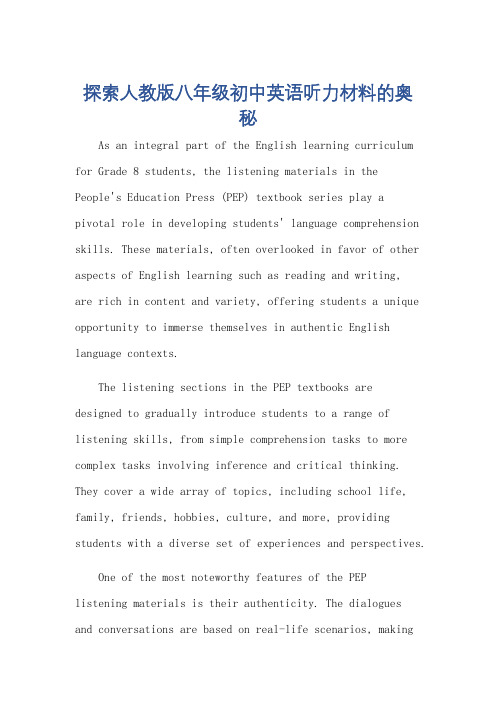
探索人教版八年级初中英语听力材料的奥秘As an integral part of the English learning curriculum for Grade 8 students, the listening materials in thePeople's Education Press (PEP) textbook series play apivotal role in developing students' language comprehension skills. These materials, often overlooked in favor of other aspects of English learning such as reading and writing,are rich in content and variety, offering students a unique opportunity to immerse themselves in authentic English language contexts.The listening sections in the PEP textbooks aredesigned to gradually introduce students to a range of listening skills, from simple comprehension tasks to more complex tasks involving inference and critical thinking. They cover a wide array of topics, including school life, family, friends, hobbies, culture, and more, providing students with a diverse set of experiences and perspectives. One of the most noteworthy features of the PEPlistening materials is their authenticity. The dialoguesand conversations are based on real-life scenarios, makingthe language more relatable and accessible to students. This authenticity also helps students to better understand and appreciate the nuances of the English language, such as informal expressions, cultural references, and idioms.Moreover, the listening materials in the PEP textbooks are designed to encourage active listening. They often include questions that require students to analyze and interpret the information presented, rather than simply recognize keywords or phrases. This approach fosters a deeper understanding of the material and helps students to develop their analytical skills.In addition to its educational value, the PEP listening materials are also highly engaging. The use of dialogues and narratives, coupled with engaging audio recordings, keeps students engaged and interested. This engagement is crucial for maintaining students' motivation and momentumin their language learning journey.However, effective utilization of these listening materials requires teachers to guide students in the right direction. Teachers should encourage students to actively participate in listening activities, such as role-playing,discussions, and debates, to help them apply the language they have learned in real-world contexts. Teachers should also provide feedback and guidance to help studentsidentify areas where they need to improve their listening skills.In conclusion, the listening materials in the PEP textbooks for Grade 8 English are an invaluable resourcefor enhancing students' language comprehension skills. By providing authentic, engaging, and diverse content, these materials prepare students for the challenges they will encounter in real-world language use. With the guidance of teachers who emphasize active listening and critical thinking, students can fully capitalize on the potential of these materials and take their English language skills to new heights.**人教版八年级初中英语听力材料的奥秘探索**作为人教版八年级英语教科书的重要组成部分,听力材料在培养学生语言理解能力方面发挥着至关重要的作用。
初中英语听力训练材料推荐
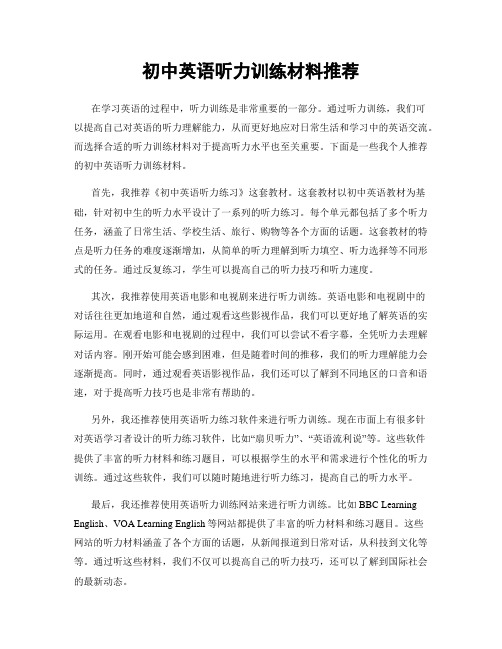
初中英语听力训练材料推荐在学习英语的过程中,听力训练是非常重要的一部分。
通过听力训练,我们可以提高自己对英语的听力理解能力,从而更好地应对日常生活和学习中的英语交流。
而选择合适的听力训练材料对于提高听力水平也至关重要。
下面是一些我个人推荐的初中英语听力训练材料。
首先,我推荐《初中英语听力练习》这套教材。
这套教材以初中英语教材为基础,针对初中生的听力水平设计了一系列的听力练习。
每个单元都包括了多个听力任务,涵盖了日常生活、学校生活、旅行、购物等各个方面的话题。
这套教材的特点是听力任务的难度逐渐增加,从简单的听力理解到听力填空、听力选择等不同形式的任务。
通过反复练习,学生可以提高自己的听力技巧和听力速度。
其次,我推荐使用英语电影和电视剧来进行听力训练。
英语电影和电视剧中的对话往往更加地道和自然,通过观看这些影视作品,我们可以更好地了解英语的实际运用。
在观看电影和电视剧的过程中,我们可以尝试不看字幕,全凭听力去理解对话内容。
刚开始可能会感到困难,但是随着时间的推移,我们的听力理解能力会逐渐提高。
同时,通过观看英语影视作品,我们还可以了解到不同地区的口音和语速,对于提高听力技巧也是非常有帮助的。
另外,我还推荐使用英语听力练习软件来进行听力训练。
现在市面上有很多针对英语学习者设计的听力练习软件,比如“扇贝听力”、“英语流利说”等。
这些软件提供了丰富的听力材料和练习题目,可以根据学生的水平和需求进行个性化的听力训练。
通过这些软件,我们可以随时随地进行听力练习,提高自己的听力水平。
最后,我还推荐使用英语听力训练网站来进行听力训练。
比如BBC Learning English、VOA Learning English等网站都提供了丰富的听力材料和练习题目。
这些网站的听力材料涵盖了各个方面的话题,从新闻报道到日常对话,从科技到文化等等。
通过听这些材料,我们不仅可以提高自己的听力技巧,还可以了解到国际社会的最新动态。
初中英语听力训练原文附答案

★英语听⼒频道为⼤家整理的初中英语听⼒训练原⽂附答案,供⼤家参考。
更多阅读请查看本站频道。
1. What's the matter with Steve?A. He has a cold.B. He has the flu.C. He has a stomachache.2. How long has Steve been sick?A. since FridayB. since SaturdayC. since Sunday3. How often should Steve take the medicine the doctor prescribes?A. three times a day with mealsB. four times a day before mealsC. three times a day after meals4. What does Carla suggest he do?A. take herbal medicineB. see another doctorC. eat chicken soup5. What does Steve decide to do?A. talk to another friendB. listen to Carla's suggestionC. see the same doctor again答案1. He has a cold.2. since Sunday3. three times a day after meals4. take herbal medicine5. listen to Carla`s suggestion英语听⼒原⽂Carla: So, how are things going, Steve?Steve: Well, to be honest Carla, I was feeling great on Saturday, but I started to feel sick Sunday afternoon. I thought I'd get better, but I feel worse than before. And I'm really worried because I'm scheduled to give a presentation at work on Friday, so I have to be better by then.Carla: Well, what seems to be the problem?Steve: Well, I thought I had the flu, but the doctor said it was just a bad cold. He gave me some cold medicine to take care of my stuffy nose and fever. I'm supposed to take the medicine three times a day after eating, but it doesn't seem to help. He also told me to stay off my feet for a day or so, but I'm so busy these days.Carla: Listen, forget about that medicine! I have just the thing to get rid of bad colds. You see, my mom is really into herbal medicine.Steve: Oh, no thanks.Carla: Ah, come on! Give it a try. You just take some of my mom's herbal tea and drink it four times a day. Believe me. You'll be up and dancing around in no time.Steve: Dancing around in no time, right? Well, I guess. Nothing else seems to be doing the job.Carla: Great. I'll come by your place at 7:30. See you then.英语单词词组1. flu (noun): informal for influenza, like a very bad cold with chills and fever- Sometimes, doctors have to be very discreet when talking with their family about patients.2. stuffy (adjective): closed or blocked- I have a really stuffy nose and can't breathe very well.3. be supposed to (verb): expected to do something- She was supposed to stay in bed and rest, but she went to work instead.4. seem (verb): appear- My dad didn't seem very sick this morning, but he got worse during the rest of the day.5. stay off your feet (idiom): put into action- If you want to get better, you have to stay off your feet for a few days.6. get rid of (phrasal verb): do away with, eliminate- Try my garlic soup. It'll help get rid of your bad stuffy nose.7. come on: said to encourage someone to do something- Come on! Call and make an appointment to see the doctor. You're not going to get better on your own.。
- 1、下载文档前请自行甄别文档内容的完整性,平台不提供额外的编辑、内容补充、找答案等附加服务。
- 2、"仅部分预览"的文档,不可在线预览部分如存在完整性等问题,可反馈申请退款(可完整预览的文档不适用该条件!)。
- 3、如文档侵犯您的权益,请联系客服反馈,我们会尽快为您处理(人工客服工作时间:9:00-18:30)。
本书精选近几年各省市中考听力真题和原创试题,所选题目具有效性、典型性、趣味性,题目设置与中考同步。 作者:金盾主编 市场价:¥10.3
作者:王会成 出版社:新华出版社 市场价:¥9.7
6.《快捷英语.中考听力周周练(磁带)》
这套丛书的内容按周次设计,适合学生同步自测。每周均附有训练,应试技巧指导,有助于学生体会规律,举一反三。列出相关高频语言点和经典表达,有助于学生不断积累听力语言素材,培养语感。
作 者:于雨 市场价:¥29
7. <&页
《听力理解》遵循由浅入深的原则,指导学生如何提高听力水平。书中安排了单句、对话和短文的专项听力训练,以及大量综合性训练。其中,句子理解、短对话理解和情景反应练习旨在帮助学生养成直接用英语思维的习惯;长对话理解、短文理解练习旨在让学生在较真实的语言环境中,通过强化训练,有效地提高英语思考能力和听的能力。经验丰富的教师总结的应试技巧和精彩分析非常有利于学生的自主学习、复习和考试。本书是专门为参加中考的学生编写的。
下面就借这次机会,给大家推荐一些对于我们初中生来说不错的英语听力材料。
1.《初中英语同步听力》系列教材
《初中英语同步听力》系列教材是提供学生进行听力自主训练的不错选择。本书依据《英语课程标准》关于初中英语学习的目标和要求进行编写,旨在使学生通过一定听力实践活动全面提高英语听力技巧,从而提高实际运用语言的力。该书配合教材模块进度,紧扣语言学习重点;任务型评价和测试相结合,实用性强;由英国专家录音,发音地道、精准。书中的练习形式灵活多样,既有客观性的听力理解训练,又有开放性的练习形式,如:听写结合的填空完成句子等,并配插图,趣味性强很强。
8. 《中考英语听力全真模拟试卷》
《中考英语听力全真模拟试卷》根据各地听力考试的发展趋势、针对学生不同的能力技巧来编写。题材广泛、语言地道、信息量大。配有20套全真模拟试卷。以新课程标准为纲,强化英语听力训练,涵盖典型中考试题,提升中考听力水平。
作者:朱信明 出版社:外文出版社 市场价: ¥29.80
初中英语听力材料
对于很多同学,在学校里接受的英语听力训练还是不够的。而我们知道提高听力技能的根本途径在于多听并会听。多听,需要老师帮助提供好的听力材料,保证足够量的训练;会听,需要老师教会学生有效的方法。如何才能在离开老师的指挥棒后听力水平仍能够不断提高呢。还是要做到多加练习,实践模拟,课内与课外相结合,细水长流,持之以恒,相信心血不会白费。
作者:叶宁庆 出版社:奔流音像 市场价:¥6.00
3. 《初中听力突破系列中考》 由李阳老师和中学英语骨干教师依据《初中英语新课程标准》和最新《考试说明》编写,涵盖中考的常考题型以及日常训练的各种题型。适合学习各种教材的学生,是进行课外听力训练的不错选择。
作者:李阳 出版社:广东省语言音像电子出版社 4.《金星英语 * 中考英语听力》
以上听力辅导书目都是同学们自主学习和准备考试的不错选择。选择其中一两本,好好利用,坚持练习,就会有收获。只要勤加练习,对照原文,总结错题,充满信心,你会发现听力并不难。它不会再成为羁绊我们前行的绊脚石,你会爱上听力,有了语感,有了方法,正确率不断提高,会不禁为自己骄傲。同学们,敢拼才会赢。学习改变命运,未来掌握在我们自己的手中。加油吧!
出版社:外语教学与研究出版社 市场价:¥7.90
2.《初中英语听力关键》 本书共分四部分:第一部分为听力技巧概论,内容包括初中听力的学习目标、命题规律以及应试技巧;第二部分分别从英美英语差异、连续与爆破、语调与重音、简化与弱化等几个方面,试图帮助考生消除语音障碍;第三部分则讲解了辨识题、数字题、推断题、图示题和解题技巧;第四部分为实践模拟演练。采取一题一解的形式进行剖析和示范,让同学们从解题中发现自己的不足,并给学生及时提供指导性建议。《初中英语听力关键》口碑很好,是很受学生欢迎的听力参考书。
5. 《星火英语听力第一教材》(《英语听力第一教材》)
本套丛书在内容编写上充分体现了思路新颖、体例独特;教学练考,四位一体;活全专新,事半功倍三大特点。如第一章就专门对中考重点话题进行训练,包括学校生活与语言学习、购物,饮食与健康、兴趣与爱好等等。第一章中的每一单元又包括黄金表达、热身练习、真题体验和专项练习四部分。第二章中练习的是最新中考听力模拟试题,第三章则是听力原文与答案速查。
